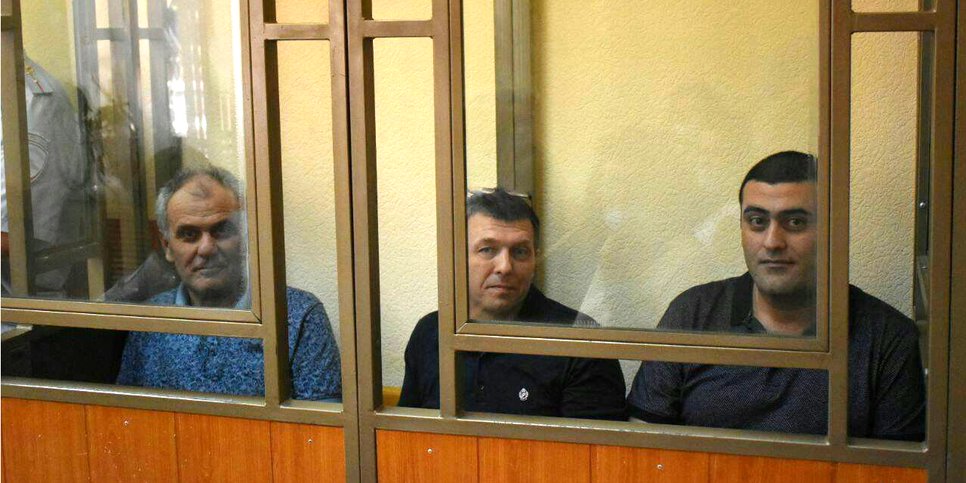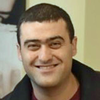In the photo: Vilen Avanesov, Alexander Parkov, Arsen Avanesov in the courtroom, July 2021
In the photo: Vilen Avanesov, Alexander Parkov, Arsen Avanesov in the courtroom, July 2021
In Rostov-on-Don, Three of Jehovah's Witnesses Receive From Six to Six and a Half Years in Prison for Talking About the Bible
Rostov RegionOn July 29, judge of the Leninskiy District Court of Rostov-on-Don, Vladimir Khudaverdyan, found three local believers guilty and sentenced Alexandr Parkov and Arsen Avanesov to 6.5 years, and Vilen Avanesov to 6 years of actual imprisonment. The court considered it a crime of extremist orientation to discuss the Bible and Christian teachings.
The believers de jure have already served about half of their term, since they were in a pre-trial detention center for more than 2 years, while the investigation and the trial lasted.
Vilen, Arsen and Alexandr do not admit their guilt in extremism. Speaking in court with the last word, Vilen Avanesov said that after the ban on legal entities of Jehovah's Witnesses in Russia in April 2017, he did not stop professing the faith, and this right is enshrined in the country's Constitution: “Why am I here, in the dock? Despite all this, I have not lost my faith in God and people, my conscience is clear. "
Arsen Avanesov, in turn, emphasized: “A person must overcome any craving for violence and rebellion in himself if he wants to become Jehovah's Witness. And this fact makes the accusation of extremism on Jehovah's Witnesses simply absurd."
Alexandr Parkov told the court that the Bible-based beliefs of Jehovah's Witnesses encourage them to create, not destroy. "The Bible helps to correct the negative aspects of a person," he said.
The criminal case against the believers was initiated on May 20, 2019. On the same day, security officials conducted searches in 15 houses of Rostovites, who were suspected of professing the religion of Jehovah's Witnesses. In some cases, riot policemen, breaking into apartments, used force. Father and son Avanesovs, as well as Alexandr Parkov, ended up behind bars on the same day.
During the trial, it became clear that the accusations of extremism were groundless. There was not a single victim in the case. During the court interrogations, several witnesses stated that the investigator Chaikin had fabricated their testimony. Nevertheless, the prosecutor asked the court to appoint the believers from 7 to 7.5 years in a general regime colony.
The litigation and imprisonment have dramatically affected the lives of the three families. Arsen Avanesov was the main breadwinner. Since he and his 68-year-old father ended up behind bars, Arsen's mother was left without due care.
After the searches and arrest of Alexandr Parkov, his eldest daughter, who at that time was expecting a child, began to experience complications due to stress. And the believer himself was diagnosed with an immune disease.
In January 2021, the wife of Alexandr Parkov, Galina, was sentenced to 2 years and 3 months of suspended sentence — the case was initiated at the same time as the case against her husband, but he was later separated into a separate proceeding. After the verdict, she told what she had to endure: “There was a shock. The injustice towards me and my husband was acutely felt. The first months were spent fighting the fear. The interrogations were difficult (I attended 8 interrogations). The investigator often shouted, pressed and wanted to hear what suited him. After each interrogation, I recovered for several days."
However, the most difficult thing, in her words, is to cope with the absence of a loved one nearby. “My husband means a lot to me. I can't imagine life without him. We have always done everything and always together. And he was taken away, and millions of decisions from day to day had to be taken by herself. Alexandr’s condition worried most of all. Conditions in the pre-trial detention center are not very good, and he often had stomach aches. Longing for her husband tormented every day,” — said Galina.
The persecution of Jehovah's Witnesses by the Russian authorities is groundless, since the Supreme Court did not prohibit professing the faith of Jehovah's Witnesses individually or in community with others. The ban applies exclusively to legal entities, but not to the faith itself.
Tatyana Moskalkova, Ombudsman for Human Rights in the Russian Federation, referring to the growing number of criminal cases against believers, said in her report to the President of Russia: “These events make one think about the existence of a conflict between the constitutional right to profess one’s religion individually or jointly with others and signs of extremist activity, specified in article 282.2 of the Criminal Code of the Russian Federation. […] Vague criteria for classifying religious materials as extremist are unacceptable, when virtually any federal judge at his own discretion can prohibit any book, image, video or audio recording."



